Integrating skills testing into your recruiting process is a bit like giving your hiring team the cheat codes to success. Or having a crystal ball for recruitment.
And while it sounds a tad dramatic, it’s nothing compared to the results forward-thinking organizations are achieving today by exploring this innovative recruitment approach.
If you’re unfamiliar with skill testing, you’ve come to the right place! In this article, we will explore:
- What is a skills test?
- What’s the difference between a skills test and a skill assessment test?
- The most popular use cases of skills assessment tests in recruitment
- What types of skills assessment tests are out there?
Ready? Let’s go!
What is a skills test for employment?
A skills test is a standardized test used to screen candidates’ job-specific skills and competencies. A skills test can assess both technical skills and soft skills, helping employers verify that candidates have what it takes to perform on the job.
Typically, a pre-employment skills test will include multiple-choice and open-ended questions as well as coding questions when they’re relevant to the role. Skills assessment tests are an increasingly popular way for screening candidates, favored by employers for their inherent benefits, such as saving time, accelerating the hiring process, and cutting hiring costs.
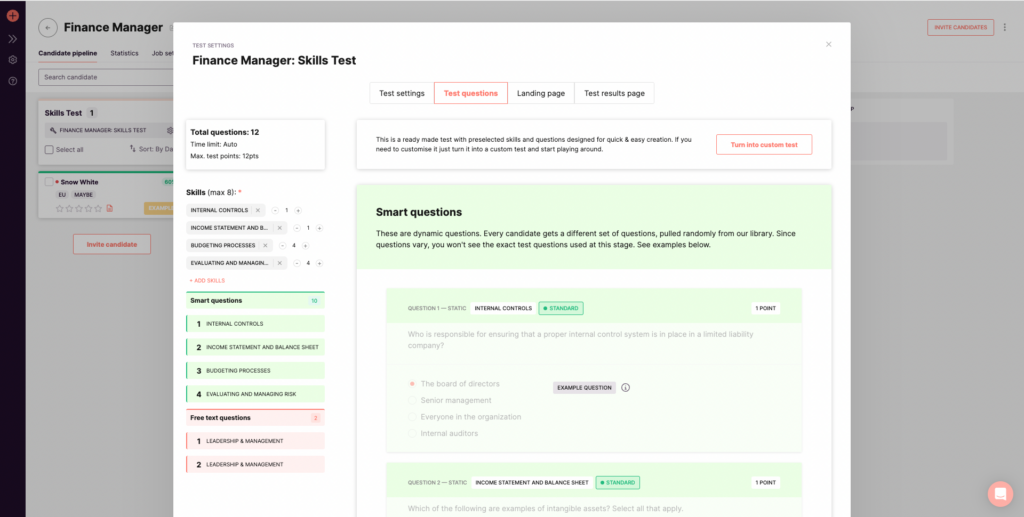
What’s the difference between a skills test and a skills assessment test?
A skills test is a standardized knowledge test designed to evaluate candidates‘ practical know-how in an unbiased, automated way. Skills tests usually follow a simple question-answer format and can be automatically graded.
In contrast, a skills assessment test is a test designed to go deeper into the nuts and bolts of technical skills required for the job. Skills assessments can have many different forms – from coding skills challenges to take-home assignments to job simulations. They typically require manual evaluation.
The main difference between a skills test and a skills assessment test is the process of performance evaluation. While skills testing gives companies a quick snapshot of applicants’ job-related knowledge, the skills assessment test evaluates a candidate’s ability to apply acquired skills and expertise in a role-specific context.

Why do companies use pre-employment assessment tests in their hiring process?
Job candidates are getting used to skills assessment tests. Few are surprised to learn the hiring process will include a skill assessment – be it a programming challenge, a soft skills assessment like problem-solving or time management, or a trial task of some kind.
But why do companies insist on using pre-employment assessments? Well, hang on to your socks – we’re going for a ride!
Here are 11 reasons why companies use skills assessment tests:
#1 – Screen large volumes of job candidates quickly
You can often hear recruiters talk about their eye for talent and how it takes 30 seconds or less to evaluate candidates’ skills just by looking at their resumes. But is it really accurate? And when you have hundreds of CVs to review – is it really the best use of the recruiter’s time?
One of the most significant advantages of skills assessment tests is that they can be graded automatically – based on the candidate’s performance during the skills test, not their CV-writing ability. And since it’s easy to administer skills assessment tests online, many hiring teams are now moving towards a skills-first application process.
Simply by tweaking their hiring process to start with an online skills test, companies solve multiple problems:
- The hiring process becomes more efficient and cost-effective.
- Recruiters can evaluate top candidates’ test results alongside their CVs for a more accurate picture.
- Companies aren’t losing out on potential great-fit candidates at the initial screening step.
- Determining which candidates have the right skills for the job becomes effortless.
Proxify, a global vetted developer marketplace, uses Toggl Hire skills assessment tests in their screening process to identify top talents in a huge pool of applicants and fast-track them in the process.
After rolling out the technical quiz on their careers page, Proxify has been able to increase the predictive confidence for inviting candidates to a pre-screen call from 60-70% to 93%. In other words, 93% of candidates suggested by the algorithm for a pre-screen would have been recommended by human recruiters.
#2 – Verify candidates’ skills and expertise
If hiring were more like sports, we would never take job applicants at their word (or their resume). Just think about it. Every championship has qualifying rounds where athletes must demonstrate their ability to move forward. When we watch the Olympics, we know we’re witnessing sportsmanship at its finest. Can the same be said about the recruitment process? Hardly so!
Skills tests offer something similar – proof of expertise. Instead of relying on job interviews or personal impressions, companies now opt for skills assessments to identify employees with the best-fit skills and qualifications for the job. It’s standardized, data-driven, and focused on spotting top candidates – just the kind of confidence boost a hiring manager needs!
#3 – Evaluate technical skills
When scaling the engineering function or looking to hire experts in specific programming languages, hiring teams can find themselves overwhelmed by the amount of work required to evaluate all job candidates or, worse – dangerously out of their depth.
If current employees don’t have enough expertise to determine which candidates can successfully perform on the job, the company faces an enormous risk of a bad hire. And no manager wants to have a track record of unsuccessful hiring.
Online assessment tools offer a reliable way to assess candidates’ technical skills. Hard skills are pretty easy to track and measure – candidates either have the skill or they don’t. What’s not so easy is devising an assessment test that would test specific skills at the right skill level in the right way. That’s where pre-built technical skills assessment tests come in.
When combined with technical interviews, skill assessment tests offer employers an unbiased, highly efficient process for assessing hard and soft skills in tech talent.
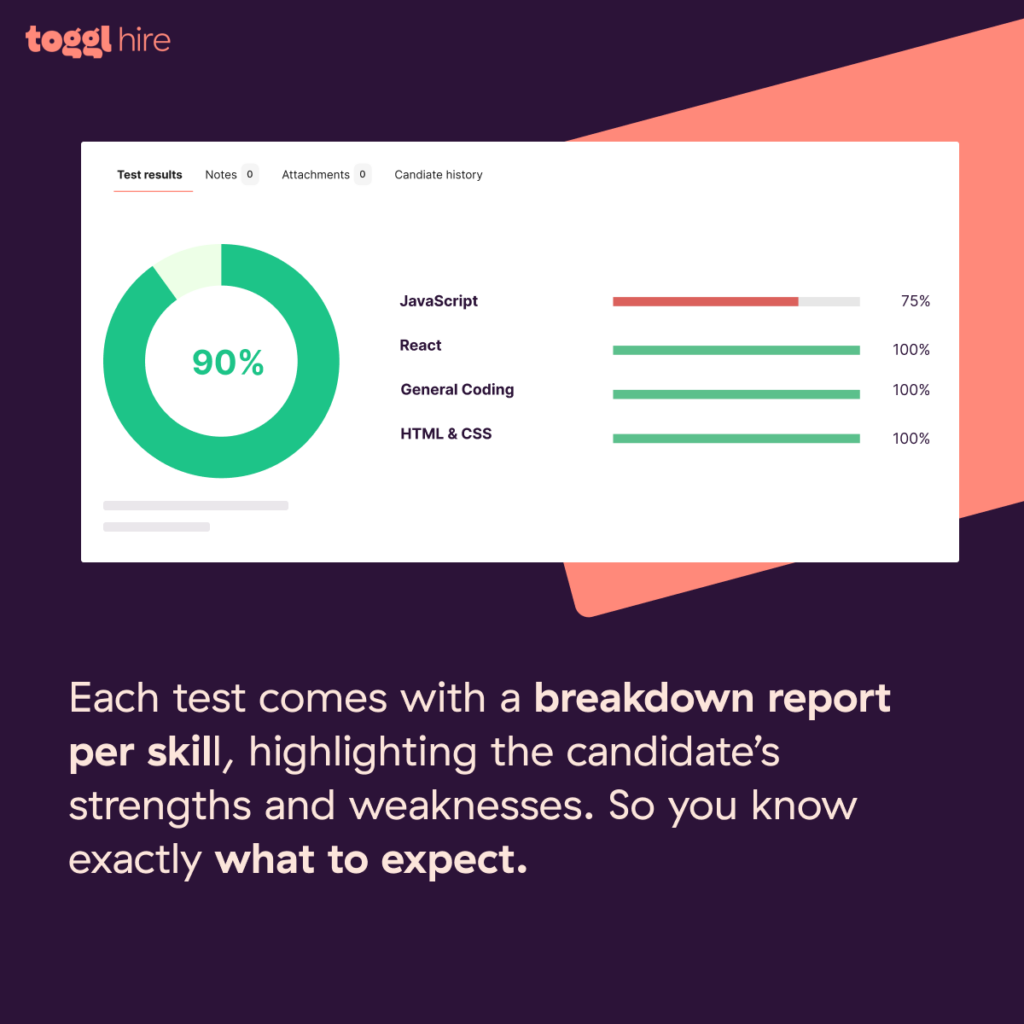
#4 – Increase the hiring speed
The truth is that the best candidates are off the market in roughly 10 days. So while companies must do their due diligence and ensure they’re employing people with the right skills, the speed of hiring will have a significant impact on the quality of candidates they’re left with.
Some of the most effective ways how to cut down the time-to-hire include:
- Revamping the interview process to reduce the number of interviews
- Enhancing the efficiency of the screening process to select only the best-fit candidates
- Providing the hiring manager with enough reliable data to make hiring decisions faster
- Removing unnecessary assessment layers, such as personality tests, that don’t predict job performance
Pre-employment testing empowers companies to move fast without breaking things.
Employing a technical screening test with a few soft skills questions mixed in for good measure enables hiring managers to identify top-level talent in one click: sort by test scores.
Whittling down the number of job candidates early in the process ensures you only interview people that demonstrate potential job fit.
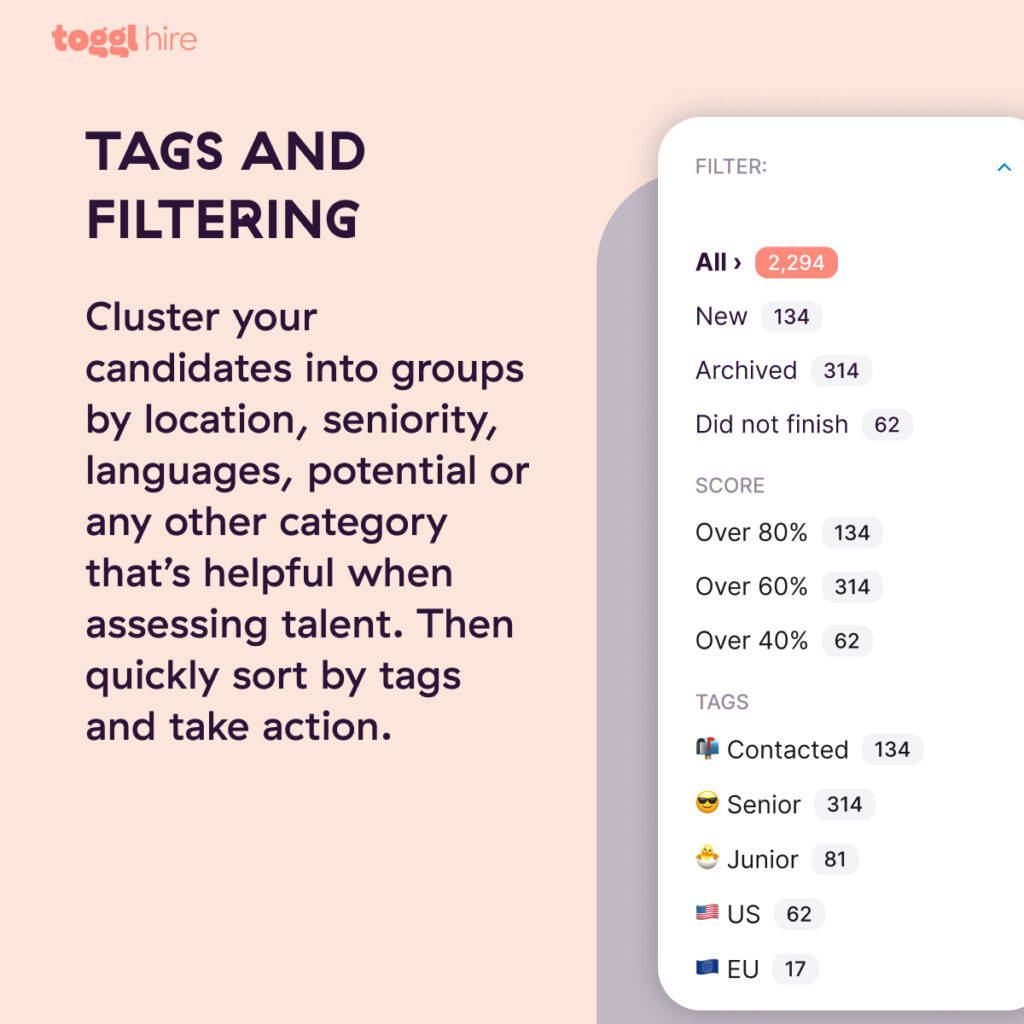
Plus, unlike technical interviews, technical tests are designed to work asynchronously. This means you can keep the pace of technical screening by stacking multiple tests into one assessment flow rather than dragging top candidates through multiple rounds of technical interviews.
#5 – Simplify campus hiring
Campus recruitment is a popular strategy for companies to source and recruit young talent, especially for entry-level positions. But it isn’t without its challenges.
For one, campus recruitment often involves screening large volumes of applications. This means traditional screening methods, like resume reviewing and conducting interviews, are not a great fit for this recruitment strategy.
On top of that, the information available to recruiters at the time of hiring is rather limited. Recent graduates often have little to no work experience, forcing companies to focus on an applicant’s potential instead of their hard skills. However, personality traits or certain soft skills do not predict a candidate’s ability to deliver good quality work. There’s a high risk of recruiting the wrong fit.
This is where using skills assessments and technical skills tests can help companies simplify and streamline their campus recruitment process. By cutting out manual application reviews and shifting the focus to shortlisting candidates based on their specific skills and qualifications, companies can quickly and efficiently identify the most qualified candidates for the job.
#6 – Assess skills accurately and bias-free
Hiring teams can succumb to unconscious biases. It’s only human!
And the first step towards reducing the potential of bias is accepting that bias is ingrained in our traditional hiring practices.
One of the popular use cases for pre employment assessments is unbiased recruitment. Judging candidates on their abilities and job-related knowledge rather than their educational background, race, sex, location, or any other irrelevant factors, helps hiring teams increase the diversity of their talent pool.
Better still, skills assessments are usually administered in a standardized format, making it incredibly easy to benchmark candidates’ performance without favoritism. The same assessment methods and criteria are applied to all candidates. Marrying the assessment practice with structured interviews is a powerful antidote to bias in the recruitment process.
#7 – Find the most talented people
Why is it so difficult to find great employees? Because they’re always working somewhere else…
Jokes aside, the ability to spot talent gems in a candidate pool can be considered a recruitment superpower. But you don’t need to be a supernatural HR hero to be able to identify exceptionally talented people. All you need is a combination of structured evaluations, consistent standards throughout the hiring process, and reduced bias.
A skills assessment test, adjusted to match specific job requirements, can quickly filter out above-average candidates worth interviewing. This way, you can be sure that you’re only spending time and resources on the most promising candidates, and not wasting time on those who may not be a good fit.
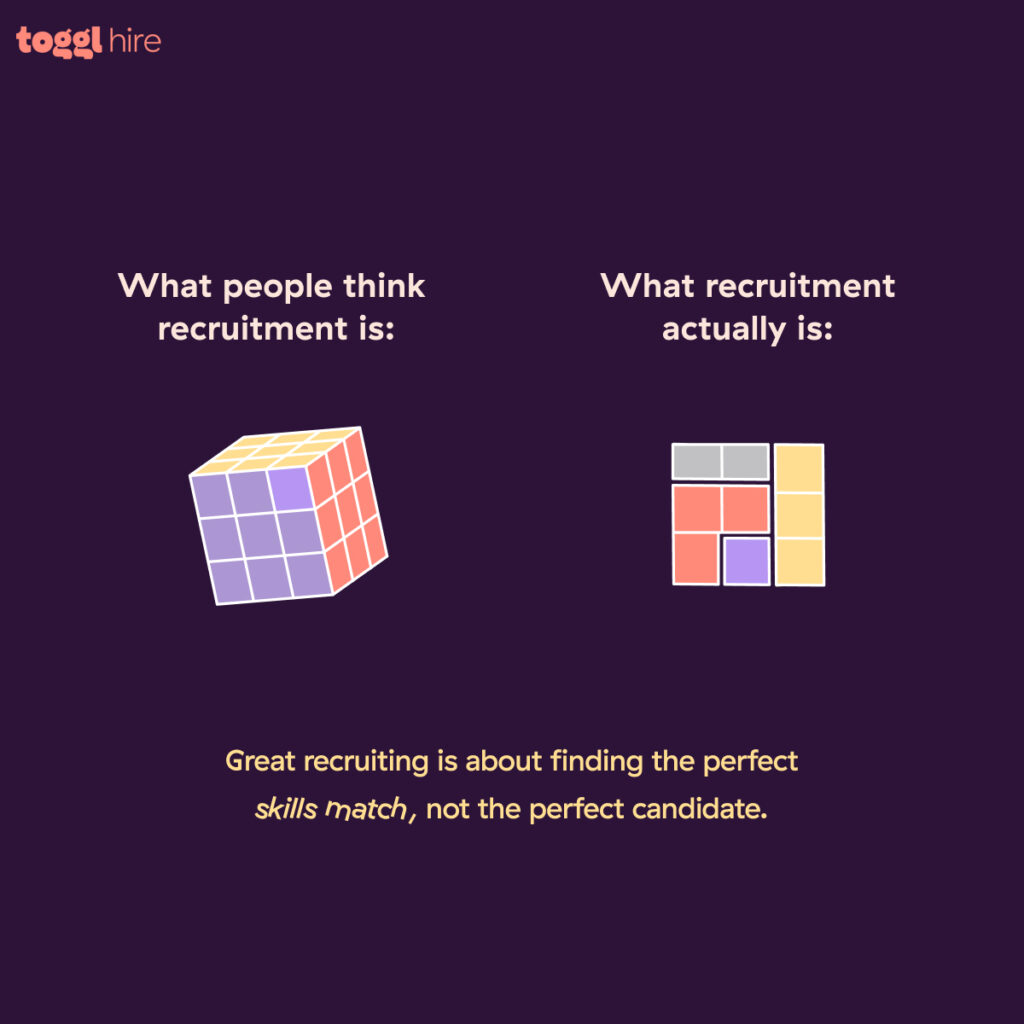
Plus, if you only test skills that are absolutely key to successful job performance, you’ll give candidates a clearer indication of the role’s day-to-day responsibilities. And this brings us to the next major point – candidate experience.
#8 – Improve the candidate experience
If you ask job candidates, all they want from a recruitment process is more transparency:
- Constructive feedback if they were rejected
- Updates on the status of their application
- Clear outlining of the role’s responsibilities
- Fair and unbiased evaluation of their skills
Companies looking to provide a better application experience for candidates don’t need to look far – assessment tests tick most of the boxes.
First of all, skills assessment tests help to streamline the recruitment process. This means candidates don’t need to wait around for weeks, if not months, to hear back from the recruiter.
As an example, we have recently hired a backend developer in under 12 days – from a job description to an accepted offer. Needless to say, candidates love the fast-track experience!
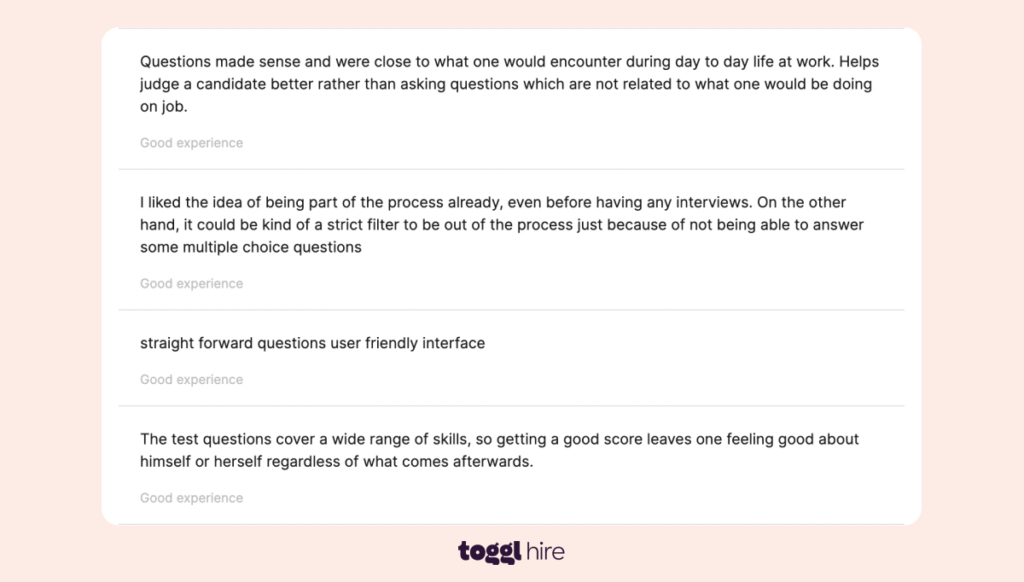
Then, there’s the question of fair chance hiring.
A candidate’s resume may be impressive, but it doesn’t necessarily tell the whole story. Skills assessments give everyone an equal opportunity to showcase their abilities and skills in a more tangible way – and ensure candidates are evaluated on a level playing field. This helps companies to get a better sense of who a candidate really is, and how they will perform on the job.
Candidate ghosting is another sensitive topic in the recruitment world. Many recruiters would love to provide personalized feedback to everyone but physically can’t do it because of the volume of applications.
Using a skills test at the beginning of the application process can solve this problem, too. Since skills tests are graded automatically, candidates can see how they scored at the end of the test. Not only does it help them understand what skills they need to improve, but it also serves as instant feedback informing them of the next steps in the process.
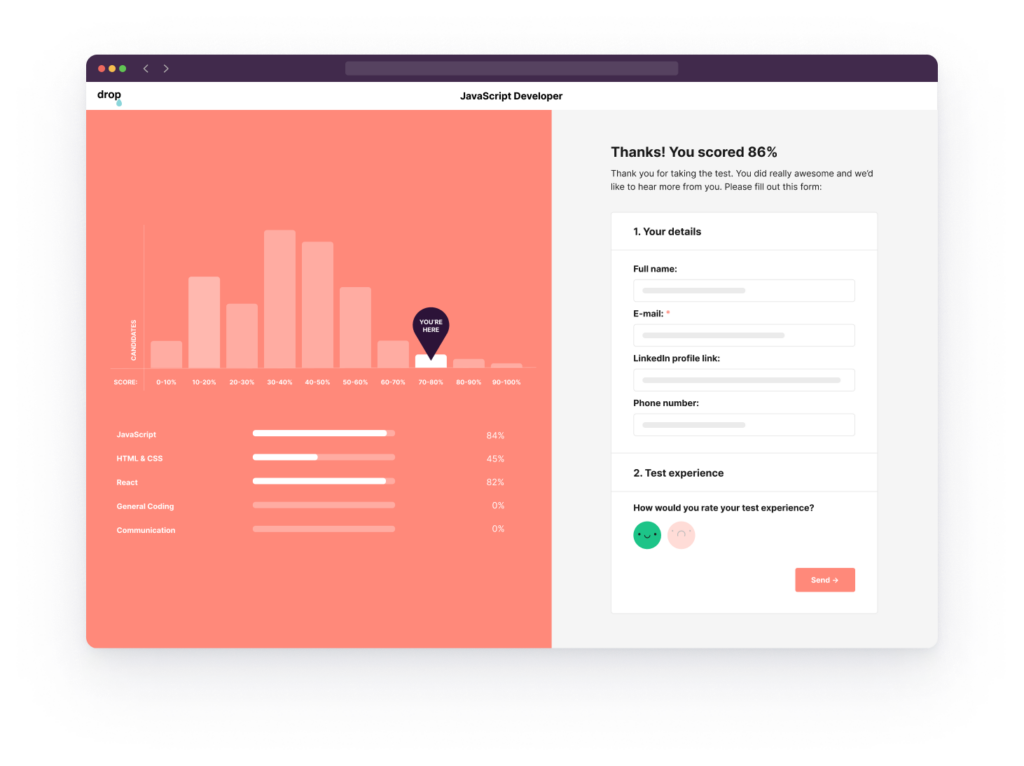
#10 – Identify skills gaps
The concept of a skills gap is often overlooked in the business world but is critical to the success of any organization.
Everyone accepts the idea that building a successful organization is about having the right people in the right seats. But few spend time fine-tuning their recruitment strategies to ensure that those people have the right skills and knowledge to perform their jobs effectively.
How do we go about building teams with the skills and knowledge to meet the demands of the business? The answer is simple: we use skill assessment tests to identify an organization’s skills gaps.
After pinpointing critical skills, organizations can launch strategic initiatives to close the biggest skills gaps:
- Training and upskilling: By identifying skills gaps, HR leaders can determine where the employees need additional training and development to improve their performance.
- Skills-based hiring: Assessing an organization’s skills gaps can help determine the specific skills and qualifications that are needed for each position. When this information is used to guide hiring decisions, companies can ensure they bring the right talent with the right skills to fill those gaps. And not just for immediate needs but also for future-proofing the organization.
- Internal mobility: By continuously assessing skills gaps and investing in the development of their employees, companies can ensure that they have the skills and knowledge to grow and advance within the organization.

Essentially, pre employment tests work a bit like the Sorting Hat from Harry Potter – providing valuable insight into the specific skills each candidate possesses and helping to place them in the right seats.
#11 – Reduce employee turnover
High employee turnover can be incredibly damaging to any company.
You see, it’s not just about losing valuable employees but also about the cost and disruption it causes to the organization. And while there are many reasons employees may decide to quit – from toxic company culture to inadequate compensation to limited career prospects – the truth is that a lot of that turnover can be prevented by improving the recruitment process.
Let me explain.
Organizations that practice skills-based hiring tend to bring in the right people with the right skills for the job. And when employees have the skills and knowledge to perform their jobs effectively, they are more likely to be engaged, motivated, and satisfied in their roles.
Beefing up the recruitment process with skill assessment tests improves the company’s initial decision-making process. And if skill testing is incorporated into their talent management strategies, it helps organizations invest in the right employee upskilling programs.
When employees feel valued and see opportunities for growth within the company, they are less likely to leave. They feel invested in the company, and the company invested in them.
What types of skills assessment tests are out there?
There is no such thing as the best approach to pre-employment testing. But knowing how different types of assessment tests fit into the recruitment process is like knowing which button to press on a washing machine! So let’s see…
Skills assessment tests
Skills assessment tests are technical assessments or job knowledge tests that measure a person’s proficiency or expertise in a specific skill or set of skills. They are used to evaluate a candidate’s current abilities and knowledge in a specific field or occupation.
Skills assessment tests differ from other test types, such as personality tests, aptitude tests, or cognitive ability assessments, in that they are focused on evaluating specific skills, qualifications, or technical knowledge related to a particular job or profession.
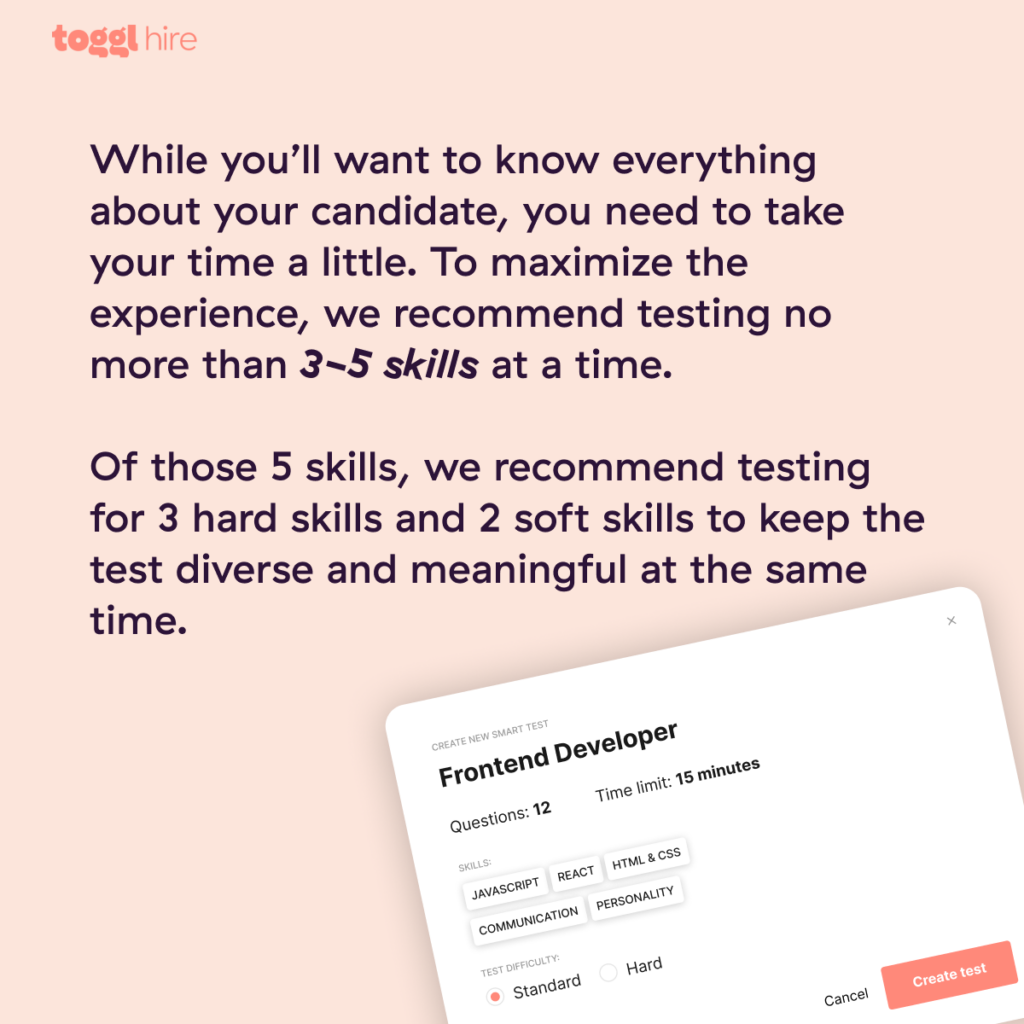
They are designed to measure what a person can do or how well they can perform a specific task and are not intended to measure potential, general intelligence, or personality traits.
These tests can be used for a wide range of jobs and industries, from entry-level positions to professional certifications. They can be used in recruitment, employee development, and career counseling to match job applicants with the most suitable job or to identify areas for employee improvement.
Cognitive ability tests
A cognitive ability test is a type of psychological assessment that measures a person’s cognitive abilities or mental capabilities, such as problem-solving, memory, and reasoning.
It is often used to measure a candidate’s general intelligence and overall potential to learn and perform a job. Some examples of cognitive ability tests include IQ tests, aptitude tests, and reasoning tests.
These tests are designed to assess a candidate’s ability to think critically and make logical decisions, which can be useful for certain types of roles and industries such as finance, engineering, and IT.
Personality tests
A personality test is a psychological assessment that measures a person’s characteristics, traits, and patterns of behavior and thinking.
These tests are designed to identify a person’s unique personality profile, which can be used to predict their behavior, attitudes, and performance in different situations.
There are different personality tests, such as the Myers-Briggs Type Indicator, the Big Five personality test, and the DISC assessment. Each test uses different methods and questions to measure different aspects of personality, and they have different applications in different industries, such as human resources, education, and psychological counseling.
Aptitude tests
Aptitude tests are psychological assessments that measure a person’s potential or natural ability to perform a certain task or learn a certain skill.
These tests are designed to predict a person’s ability to learn and perform certain types of tasks or jobs. Different aptitude tests measure different abilities, such as verbal, numerical, spatial, and mechanical abilities.
Aptitude tests are used in a variety of industries, such as education, career counseling, and recruitment, to identify potential talents and match them with the most suitable job, course, or career path.
Job simulations
Job simulations are assessments that are designed to mimic real-life work tasks, situations, or scenarios that a candidate is likely to encounter in a specific role. They are used to evaluate a candidate’s ability to perform specific tasks, make decisions, and solve problems, simulating a typical day on the job.
Job simulations differ from skills assessments in that they offer a more realistic and comprehensive evaluation of a candidate’s abilities since they present the candidate with tasks and challenges relevant to the specific job they are applying for.
These simulations often use virtual or interactive environments and are used to evaluate skills such as critical thinking, problem-solving, decision-making, and time management. Or can be employed in the form of homework assignments.
Final thoughts on skill assessment tests in recruitment
Recruitment often feels like trying to find the needle in the haystack. Especially in times of disruption, when the ability to identify and hire top talent is the X factor organizations need to thrive.
Resumes can be misleading, and interviews can be a bit of a hit or miss. But with skills assessments, you get a bird’s eye view of a candidate’s abilities and can quickly separate the best from the rest.
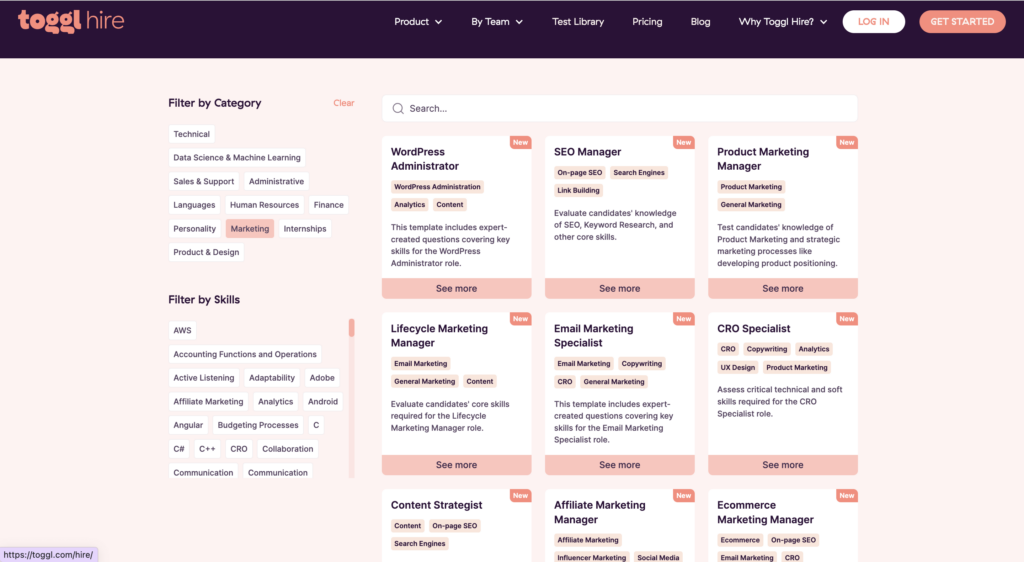
So, if you’re ready to give skills assessment tests a shot, head over to our Test Library to browse assessment templates and see what it has to offer!
Juste loves investigating through writing. A copywriter by trade, she spent the last ten years in startups, telling stories and building marketing teams. She works at Toggl Hire and writes about how businesses can recruit really great people.









